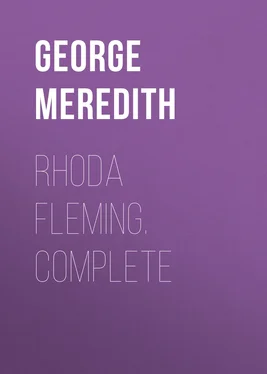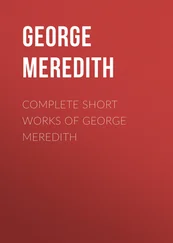George Meredith - Rhoda Fleming. Complete
Здесь есть возможность читать онлайн «George Meredith - Rhoda Fleming. Complete» — ознакомительный отрывок электронной книги совершенно бесплатно, а после прочтения отрывка купить полную версию. В некоторых случаях можно слушать аудио, скачать через торрент в формате fb2 и присутствует краткое содержание. Жанр: foreign_prose, literature_19, foreign_antique, на английском языке. Описание произведения, (предисловие) а так же отзывы посетителей доступны на портале библиотеки ЛибКат.
- Название:Rhoda Fleming. Complete
- Автор:
- Жанр:
- Год:неизвестен
- ISBN:нет данных
- Рейтинг книги:3 / 5. Голосов: 1
-
Избранное:Добавить в избранное
- Отзывы:
-
Ваша оценка:
- 60
- 1
- 2
- 3
- 4
- 5
Rhoda Fleming. Complete: краткое содержание, описание и аннотация
Предлагаем к чтению аннотацию, описание, краткое содержание или предисловие (зависит от того, что написал сам автор книги «Rhoda Fleming. Complete»). Если вы не нашли необходимую информацию о книге — напишите в комментариях, мы постараемся отыскать её.
Rhoda Fleming. Complete — читать онлайн ознакомительный отрывок
Ниже представлен текст книги, разбитый по страницам. Система сохранения места последней прочитанной страницы, позволяет с удобством читать онлайн бесплатно книгу «Rhoda Fleming. Complete», без необходимости каждый раз заново искать на чём Вы остановились. Поставьте закладку, и сможете в любой момент перейти на страницу, на которой закончили чтение.
Интервал:
Закладка:
The yeoman’s pride struggled out in this obscure way to vindicate his unneighbourliness and the seclusion of his daughters from the society of girls of their age and condition; nor was it hard for Rhoda to assure him, as she earnestly did, that he had acted rightly.
Rhoda, assisted by Mrs. Sumfit, was late in the night looking up what poor decorations she possessed wherewith to enter London, and be worthy of her sister’s embrace, so that she might not shock the lady Dahlia had become.
“Depend you on it, my dear,” said Mrs. Sumfit, “my Dahly’s grown above him. That’s nettles to your uncle, my dear. He can’t abide it. Don’t you see he can’t? Some men’s like that. Others ‘d see you dressed like a princess, and not be satisfied. They vary so, the teasin’ creatures! But one and all, whether they likes it or not, owns a woman’s the better for bein’ dressed in the fashion. What do grieve me to my insidest heart, it is your bonnet. What a bonnet that was lying beside her dear round arm in the po’trait, and her finger up making a dimple in her cheek, as if she was thinking of us in a sorrowful way. That’s the arts o’ being lady-like—look sad-like. How could we get a bonnet for you?”
“My own must do,” said Rhoda.
“Yes, and you to look like lady and servant-gal a-goin’ out for an airin’; and she to feel it! Pretty, that’d be!”
“She won’t be ashamed of me,” Rhoda faltered; and then hummed a little tune, and said firmly—“It’s no use my trying to look like what I’m not.”
“No, truly;” Mrs. Sumfit assented. “But it’s your bein’ behind the fashions what hurt me. As well you might be an old thing like me, for any pleasant looks you’ll git. Now, the country—you’re like in a coalhole for the matter o’ that. While London, my dear, its pavement and gutter, and omnibus traffic; and if you’re not in the fashion, the little wicked boys of the streets themselves ‘ll let you know it; they’ve got such eyes for fashions, they have. And I don’t want my Dahly’s sister to be laughed at, and called ‘coal-scuttle,’ as happened to me, my dear, believe it or not—and shoved aside, and said to—‘Who are you?’ For she reely is nice-looking. Your uncle Anthony and Mr. Robert agreed upon that.”
Rhoda coloured, and said, after a time, “It would please me if people didn’t speak about my looks.”
The looking-glass probably told her no more than that she was nice to the eye, but a young man who sees anything should not see like a mirror, and a girl’s instinct whispers to her, that her image has not been taken to heart when she is accurately and impartially described by him.
The key to Rhoda at this period was a desire to be made warm with praise of her person. She beheld her face at times, and shivered. The face was so strange with its dark thick eyebrows, and peculiarly straight-gazing brown eyes; the level long red under-lip and curved upper; and the chin and nose, so unlike Dahlia’s, whose nose was, after a little dip from the forehead, one soft line to its extremity, and whose chin seemed shaped to a cup. Rhoda’s outlines were harder. There was a suspicion of a heavenward turn to her nose, and of squareness to her chin. Her face, when studied, inspired in its owner’s mind a doubt of her being even nice to the eye, though she knew that in exercise, and when smitten by a blush, brightness and colour aided her claims. She knew also that her head was easily poised on her neck; and that her figure was reasonably good; but all this was unconfirmed knowledge, quickly shadowed by the doubt. As the sun is wanted to glorify the right features of a landscape, this girl thirsted for a dose of golden flattery. She felt, without envy of her sister, that Dahlia eclipsed her: and all she prayed for was that she might not be quite so much in the background and obscure.
But great, powerful London—the new universe to her spirit—was opening its arms to her. In her half sleep that night she heard the mighty thunder of the city, crashing, tumults of disordered harmonies, and the splendour of the lamp-lighted city appeared to hang up under a dark-blue heaven, removed from earth, like a fresh planet to which she was being beckoned.
At breakfast on the Sunday morning, her departure was necessarily spoken of in public. Robert talked to her exactly as he had talked to Dahlia, on the like occasion. He mentioned, as she remembered in one or two instances, the names of the same streets, and professed a similar anxiety as regarded driving her to the station and catching the train. “That’s a thing which makes a man feel his strength’s nothing,” he said. “You can’t stop it. I fancy I could stop a four-in-hand at full gallop. Mind, I only fancy I could; but when you come to do with iron and steam, I feel like a baby. You can’t stop trains.”
“You can trip ‘em,” said Anthony, a remark that called forth general laughter, and increased the impression that he was a man of resources.
Rhoda was vexed by Robert’s devotion to his strength. She was going, and wished to go, but she wished to be regretted as well; and she looked at him more. He, on the contrary, scarcely looked at her at all. He threw verbal turnips, oats, oxen, poultry, and every possible melancholy matter-of-fact thing, about the table, described the farm and his fondness for it and the neighbourhood; said a farmer’s life was best, and gave Rhoda a week in which to be tired of London.
She sneered in her soul, thinking “how little he knows of the constancy in the nature of women!” adding, “when they form attachments.”
Anthony was shown at church, in spite of a feeble intimation he expressed, that it would be agreeable to him to walk about in the March sunshine, and see the grounds and the wild flowers, which never gave trouble, nor cost a penny, and were always pretty, and worth twenty of your artificial contrivances.
“Same as I say to Miss Dahly,” he took occasion to remark; “but no!—no good. I don’t believe women hear ye, when you talk sense of that kind. ‘Look,’ says I, ‘at a violet.’ ‘Look,’ says she, ‘at a rose.’ Well, what can ye say after that? She swears the rose looks best. You swear the violet costs least. Then there you have a battle between what it costs and how it looks.”
Robert pronounced a conventional affirmative, when called on for it by a look from Anthony. Whereupon Rhoda cried out,—
“Dahlia was right—she was right, uncle.”
“She was right, my dear, if she was a ten-thousander. She wasn’t right as a farmer’s daughter with poor expectations.—I’d say humble, if humble she were. As a farmer’s daughter, she should choose the violet side. That’s clear as day. One thing’s good, I admit; she tells me she makes her own bonnets, and they’re as good as milliners’, and that’s a proud matter to say of your own niece. And to buy dresses for herself, I suppose, she’s sat down and she made dresses for fine ladies. I’ve found her at it. Save the money for the work, says I. What does she reply—she always has a reply: ‘Uncle, I know the value of money better. ‘You mean, you spend it,’ I says to her. ‘I buy more than it’s worth,’ says she. And I’ll tell you what, Mr. Robert Armstrong, as I find your name to be, sir; if you beat women at talking, my lord! you’re a clever chap.”
Robert laughed. “I give in at the first mile.”
“Don’t think much of women—is that it, sir?”
“I’m glad to say I don’t think of them at all.”
“Do you think of one woman, now, Mr. Robert Armstrong?”
“I’d much rather think of two.”
“And why, may I ask?”
“It’s safer.”
“Now, I don’t exactly see that,” said Anthony.
“You set one to tear the other,” Robert explained.
Читать дальшеИнтервал:
Закладка:
Похожие книги на «Rhoda Fleming. Complete»
Представляем Вашему вниманию похожие книги на «Rhoda Fleming. Complete» списком для выбора. Мы отобрали схожую по названию и смыслу литературу в надежде предоставить читателям больше вариантов отыскать новые, интересные, ещё непрочитанные произведения.
Обсуждение, отзывы о книге «Rhoda Fleming. Complete» и просто собственные мнения читателей. Оставьте ваши комментарии, напишите, что Вы думаете о произведении, его смысле или главных героях. Укажите что конкретно понравилось, а что нет, и почему Вы так считаете.












